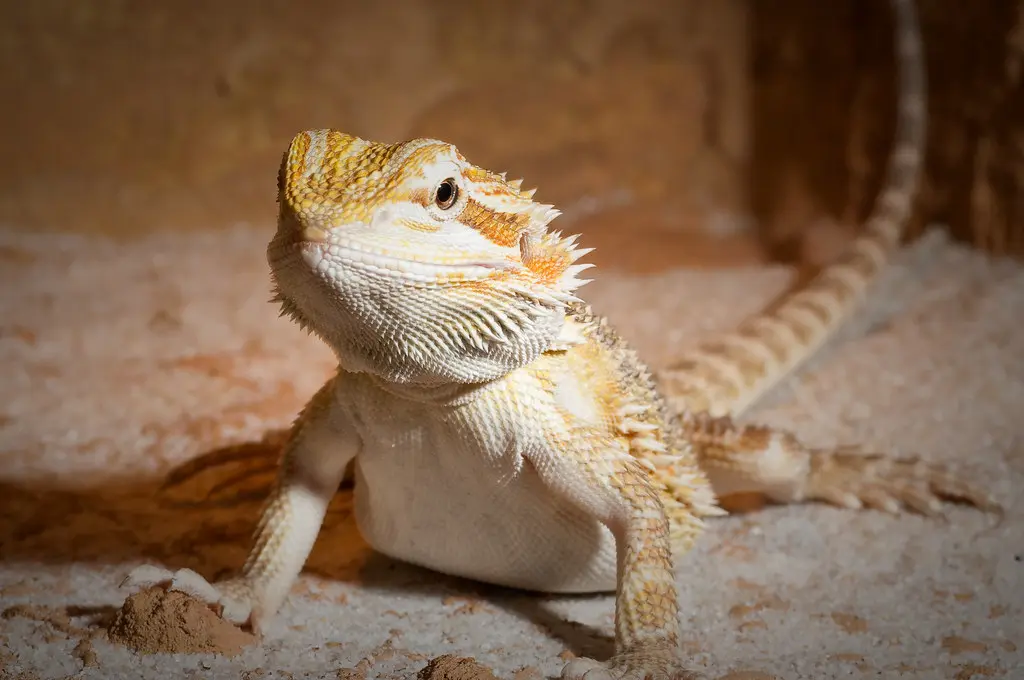Understanding common bearded dragon health issues is a key aspect of caring for these unique reptiles. When you know all about the potential problems your dragon can (and probably will face), it empowers you to provide the best possible care and create a happy and healthy environment.
Brief Overview of Bearded Dragons
Originally from Australia, bearded dragons are medium-sized reptiles that can live up to 10-12 years in captivity with proper care. They are renowned for their distinctive, spiky appearance and beard-like expandable throat area.
Known for their docile temperament and friendly appearance, bearded dragons have become beloved pets in many households. Being cold-blooded creatures, they require a controlled environment with adequate heat and light sources, a well-balanced diet, and regular veterinary checks to thrive.
Common Bearded Dragon Health Issues
Like any other creature, bearded dragons face their share of health issues. By being attentive to their needs and changes in behavior, you can address these problems effectively.
Here, we discuss the most common health problems that bearded dragons face, along with tips on prevention and treatment.
1. Metabolic Bone Disease (MBD)
MBD is a debilitating condition caused by an imbalance in the calcium-to-phosphorus ratio or inadequate access to ultraviolet (UV) light for proper vitamin D3 synthesis.
Signs
- Swollen, deformed, or fractured limbs
- Softening of the jaw (rubber jaw)
- Lethargy
- Seizures or twitching
Prevention and Treatment
- Provide a well-balanced diet rich in calcium and low in phosphorus. Dust feeder insects with calcium powder.
- Ensure your bearded dragon has access to high-quality UVB lighting for at least 10-12 hours per day.
- Consult a reptile-savvy veterinarian for an accurate diagnosis and possible calcium injections, if needed.
2. Impaction and Constipation
Impaction is a severe form of constipation experienced by bearded dragons, typically resulting from ingesting undigestible materials such as a loose substrate.
Signs
- Struggling to pass feces or a lack of bowel movements
- Bloating or a firm abdomen
- Lethargy and loss of appetite
- Dragging back legs
Prevention and Treatment
- Use a non-particulate substrate like reptile carpet or tile to avoid accidental ingestion.
- Feed appropriately sized insects (no larger than the space between your dragon’s eyes) to prevent swallowing difficulties.
- Provide a warm, shallow bath and gently massage the abdomen to stimulate bowel movements.
- Seek immediate veterinary help for severe cases, as untreated impaction can be dangerous
3. Parasitic Infections
Internal and external parasites can cause a variety of health issues in bearded dragons.
Signs
- Loss of appetite
- Weight loss
- Irregular feces or undigested food in feces
- Visible mites or crusty scales
Prevention and Treatment
- Regular fecal examinations by a reptile veterinarian to check for parasites
- Apply mite sprays or consult your vet for treatment options in case of external parasite infestations
- Ensure clean and hygienic living conditions in the terrarium and offer fresh food to minimize parasite exposure
4. Respiratory Infections
Respiratory infections occur due to various factors, including improper heating and humidity, unsanitary living conditions, or a weakened immune system.
Signs
- Labored or open-mouth breathing
- Wheezing sounds
- Excess mucus or bubbles coming from the mouth or nose
- Loss of appetite and lethargy
Prevention and Treatment
- Maintain appropriate and stable temperature and humidity levels in the enclosure.
- Regularly clean the terrarium to minimize bacterial and fungal growth.
- Seek prompt veterinary care for diagnosis and medication to treat the infection.
Best Practices for Maintaining Bearded Dragon Health
Beyond swift response to noticeable symptoms, here are some best practices for maintaining healthy Bearded Dragons:
- Veterinary Care: Ensure regular vet check-ups to detect any early signs of ailments.
- Proper Habitat: Maintain optimal temperature and humidity, ensure the use of proper substrate, and provide enough space for movement.
- Balanced Diet: A balanced mix of vegetables, fruits, and protein sources are essential for your dragon’s overall health.
- Hygiene: Regular cleaning of the dragon’s habitat can eliminate many potential health issues stemming from bacteria and parasites.
Final Thoughts
Bearded dragons are unique and fascinating pets that require consistent care and attention. By understanding the health problems they may encounter, you can invest in preventive measures like proper nutrition, hygiene, and environmental control.
